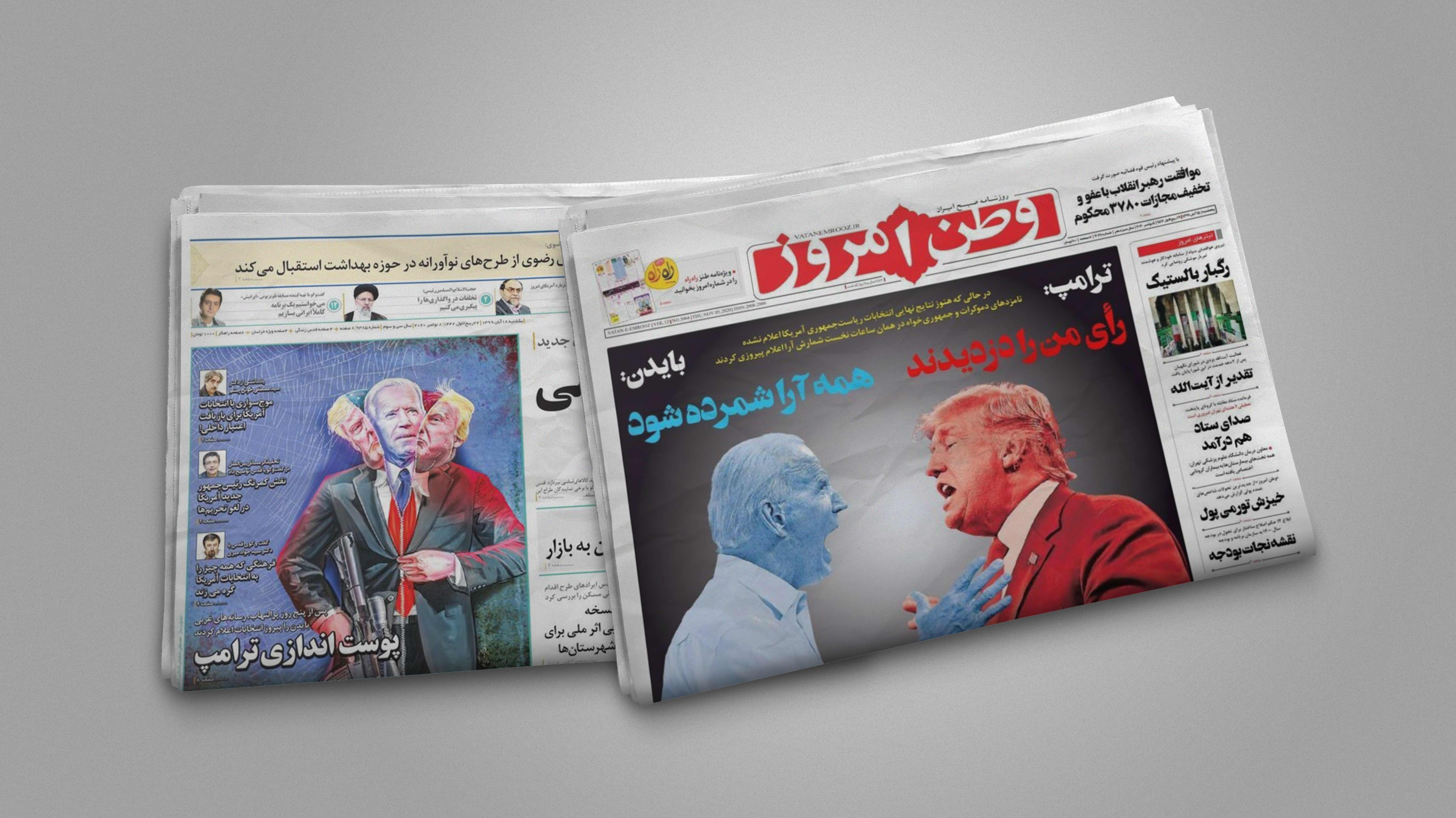
*This is a summary of the original Arabic report that can be found here.
Iranian officials’ statements on the US election and Biden’s victory have varied, but tend to carry a similar sentiment. This report examines possible paths Iran-US relations will take once the US president changes, and the likelihood of Iran returning to negotiations with the US.
Supreme Leader Ayatollah Khamenei said the results do not change Iran’s clear and unwavering policy towards the United States. Hassan Rouhani, the current president, proclaimed that the results of the US election were not the concern of his country’s policymakers, but that the future US president should honor international laws and commitments. Iranian foreign minister Javad Zarif confirmed that his country would not be renegotiating the terms of the 2015 nuclear agreement with the future president after Trump’s administration pulled out in 2018.
While Biden’s statements on Iran have been friendlier, and he has committed a US return to the nuclear agreement, he is problematic for Iran on a number of levels, not least of which is his strong support for Israel and Zionism. While Iranian officials are glad to see the Trump administration go, an immediate return to negotiations with the US is highly unlikely, particularly given Iran’s current political climate.
Iran-US relations are at a historic low, and not only due to the nuclear deal. Some of the issues date back to the Iranian revolution and subsequent US sanctions on the country. Other issues complicating the relationship include the Iranian missile program, the country’s regional influence and activities, and perhaps most importantly, the Palestinian cause and a stark difference in stances on Israel. Additionally, the US’s 2020 assassination of Qassem Soleimani, former commander of Iran’s Quds Force, is an open sore for many Iranians, and it placed those Iranians calling for negotiations in a very awkward position.
Understanding Iran’s current political context is helpful in determining the possible paths of US-Iran relations once Biden is sworn into office. Moderate Hassan Rouhani’s presidential term will end in mere months, and it is expected that a more conservative-leaning candidate will win the June 2021 Iranian presidential election. In February 2020, the Iranian Majlis (Islamic Consultative Assembly) elections gave this indication, with the moderates at their weakest and unable to produce a candidate that would beat any of the possible conservative candidates that are likely to run for the presidency in 2021.
Both Rouhani and Zarif have faced internal criticism for their suggestions that it may be necessary to return to negotiations with the US, even after Soleimani’s assassination. Rouhani has publicly stated he is not aware of any way to address Iran’s economic woes without the existence of foreign relations, in a veiled dig at the Supreme Leader’s “Resistance Economy”, and Zarif refused to rule out negotiations with the US (with the condition that all sanctions must be lifted) in an interview with Der Spiegel earlier this year. However, the reality is that Rouhani is unlikely to enter the risky game of negotiations with so little time left in his presidential term, so the real question is how worried Iran’s policymakers are about preserving their political system, which means that some type of negotiations with the US is not completely out of the question, particularly given that Biden’s presidency will offer more flexibility on the terms of these negotiations than the Trump administration did.
It can be said that Biden’s victory will also increase the likelihood that the hardliner candidate who wins Iran’s presidential elections in 2021 will have more moderate leanings. Possible candidates being floated from among the conservatives include Ali Larijani (former Speaker of the Majlis), Mhammad Bagher Ghalibaf (current Majlis Speaker), and Saeed Jalili (Khamenei’s representative to Iran’s Supreme National Security Council and key nuclear deal negotiator).
Three things are almost certain in the path of future Iran-US relations. First, barring any major changes in Iranian voter turnout, the next president of Iran will view the US with suspicion and enmity. Second, Iran will return to the idea of “Courageous Flexibility” in diplomacy. Third, directly as a result of this principle, and in order to strengthen its position in negotiations, there will be an escalation of regional activities by Iran.
In short, meeting Ayatollah Khamenei’s conditions of lifting sanctions and returning immediately to the nuclear agreement will not happen during the short time left of Rouhani’s tenure. Any future negotiations between Iran and the US will likely be multilateral rather than bilateral, particularly given the high likelihood of an upcoming conservative president. After Iran’s experience with Trump, and so long as Khamenei is holding the reins, there will also not be any negotiations on Iran’s missile program, for they view it as what preserved the country when faced with Trump’s policies. In general, Iran has indicated that it is far more likely to enter regional negotiations including Turkey and Qatar, and possibly, Iraq, that will see a return of peace to Syria, Iraq and Yemen, without sacrificing its regional presence. For Iran, clear terms and boundaries of negotiation are a necessity, and regional negotiations will take precedence over international negotiations.